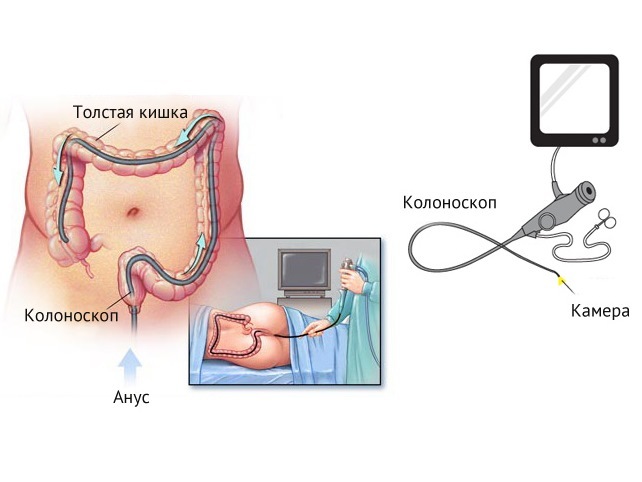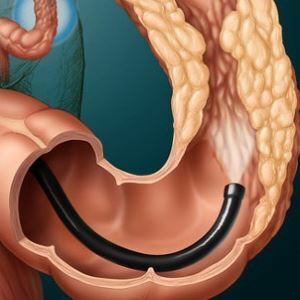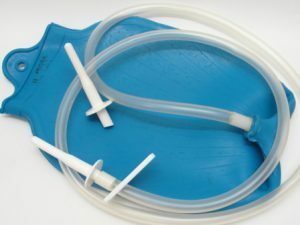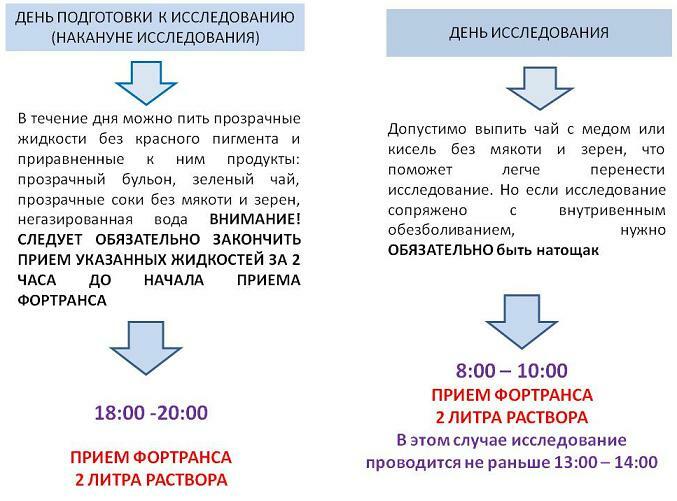Diseases of the gastrointestinal tract often require a fairly serious examination to clarify the prevalence of the process and determine the nature of the pathology. Colonoscopy is an endoscopic method of research that allows not only to carry out diagnostics. With its help, you can remove some formations, cauterize the places of erosions or bleeding vessels, and also take a biopsy from suspicious areas. This procedure provides for serious training and even sometimes general anesthesia during the procedure.
Is the colonoscopy performed on a monthly basis? What can be done to make the study as comfortable and informative as possible for the doctor and the patient?
? Features of procedure
Colonoscopy is a method of examination of the large intestinal. The average time is about 20 - 30 minutes, sometimes longer.
Colonoscopy for its performance requires special equipment - a special probe, it is supplemented with a light guide and often a conductor for the camera. In this way, you can display the resulting image on a computer monitor, which facilitates the diagnosis. The resulting video can be used in the future to compare the course of the disease and determine the effectiveness of treatment. Also, modern models suggest not only examination and visual assessment of the intestine from the inside, but also various procedures - biopsy, moxibustion, etc.

Colonoscopy
What is needed for a colonoscopy and how it is performed
Colonoscopy is performed in a specially designated room where the sterility regime is observed. An endoscopist, equipped with special equipment, with the assistance of a nurse and, if necessary, an anesthesiologist, performs everything on his own.
On the eve of the prepared patient is placed on the couch. There are two convenient positions:
- On the left side. In this case, general anesthesia is often performed by intravenous sedation. During the procedure the patient is in a half-asleep state, does not feel pain and discomfort.
- In the Trendelenburg position, facing the couch, leaning on elbows and knees. In this case, anesthesia is performed only local in the rectal area. As a rule, during further research the patient feels slight discomfort or generally everything passes without any unpleasant sensations. This situation many doctors prefer also because you can constantly monitor the patient's well-being and so control the process of colonoscopy. Even in the case of a biopsy or similar procedures a person does not feel pain.

Look at the video about the procedure:
Indications for
Colonoscopy is not a flow procedure, like a general blood test, for example. It can be accompanied by complications, not everyone can perform it. Therefore, it is necessary to do the study only according to the indications. Also, colonoscopy is not desirable during menstruation due to the greater risk of complications.
The main ones are as follows:
- In case of hereditary predisposition to intestinal cancer or in the presence of this tumor in close relatives. Colonoscopy allows you to identify the majority of tumors in the early stages, which can save a person's life.
- In some countries, for example, in Japan, colonoscopy is mandatory for everyone after reaching the age of 50 years. This is due to the high incidence of bowel cancer just after reaching this period of life.
- Some chronic diseases involve regular colonoscopy. For example, with ulcerative colitis, polyposis and some others.
- The procedure is also indicated in case of constant stool discomfort in the form of diarrhea and constipation, if there is a suspicion of intestinal bleeding, if pathological excretions from the intestine are detected( pus, excess mucus and others).
- Colonoscopy is also performed when a tumor or foreign body of the intestine is suspected.
Indications for the procedure can be extended to fit the clinical picture.
Colonoscopy contraindications
Colonoscopy should be performed at the doctor's discretion. It is he who can identify contraindications for carrying out when this manipulation presents a danger to life. The main ones are:
- the general severe condition of the patient;
- problems with blood coagulability;
- should also refrain from performing the procedure if at the moment an acute inflammatory process in any organ, including SARS and the like, is fixed;
- for severe degree of arterial hypertension, cardiac and pulmonary insufficiency, it is necessary to undergo additional specialist consultations;
- for signs of an acute abdomen and intraperitoneal bleeding, colonoscopy can not be performed;
- during pregnancy, the procedure can be performed only in the first trimester, only for very strict indications;
- menstruation is a relative contraindication;in most cases, the monthly after the colonoscopy continues to go without any changes.
What allows colonoscopy
 When performing colonoscopy, the endoscopist assesses the condition of the intestinal mucosa, the motor activity of the intestine, and even the detection of even millimeter pathological formations.
When performing colonoscopy, the endoscopist assesses the condition of the intestinal mucosa, the motor activity of the intestine, and even the detection of even millimeter pathological formations.
During a colonoscopy, the doctor can record the whole procedure on the carrier, also if necessary, a biopsy, moxibustion of blood vessels, removal of foreign bodies and some other manipulations are performed.
Preparing for the
Nobody wants to do this research twice in a row. Therefore before it it is necessary to specify all possible nuances, including whether it is possible to do a colonoscopy with monthly in this case, the attending physician. The optimal time is the week before the critical days, or immediately after the end of the bloody discharge.
In order for the procedure to be most informative, on the eve of the colonoscopy it is necessary to prepare for the study. It can be performed in several ways:
- with enemas,
- using various chemicals and adsorbents.
Already two to three days before the test should start to adhere to the diet, excluding gas-forming and inducing volumetric stool products. It is necessary to refrain from fresh fruits and vegetables, milk, some cereals, legumes and nuts.
What can I eat? Any meat, broths, white bread, sour-milk products.

With the help of enemas

Enema in preparation for colonoscopy
This is usually done in a hospital. This is the cheapest, but not quite a pleasant method.
Cleansing enema is performed in a standard way. Do it in the evening and twice in the morning. It is possible to take laxatives, for example, castor oil and the like, to improve the quality of bowel cleansing.
In the evening once it is necessary to pour in the rectum at least 1.5 liters of warm water. This should be done before the pure liquid appears during defecation.
In the morning, you also need to make two enemas to fix the effect. Independently, without assistance, it is difficult to qualitatively perform all the procedures, so in such situations it is better to use various substances for cleaning the intestines.
With the help of laxatives
Fortrans is the most popular and effective. Also along with him there are Dufalac, Fleet and their analogues.
"Fortrans" is purchased at the rate of one bag for 15 - 20 kg of a person's weight. On average, about 4 to 5. One packet is dissolved in a liter of ordinary water. The resulting volume of liquid can be drunk gradually over a period of 12 hours. Also, it can be divided into two parts: one in the evening, the other in the early morning, no later than 3 to 4 hours before the colonoscopy.

If you use Dufalac, then the 200 ml bottle should be dissolved in 2 liters of water and drunk in 3 to 3.5 hours. With the help of this medication a mild laxative effect is carried out.
Some people prefer Fleet. The entire volume of this solution( 90 ml) should be divided into two parts and drink one in the morning, and the second - in the evening. Each time you need to supplement the reception with 3 to 4 glasses of liquid.
Fortrans performs the most complete evacuation of the intestine. It is this drug that is used before various other operations and manipulations. Any of these medicines is not absorbed from the intestine, so they do not have side effects.
Is it possible to spend with monthly
? Many women are interested in whether colonoscopy is done with menstruation, and whether this is a contraindication to the conduct.
It is caused by the following factors:
- During menstruation, the bleeding of all tissues is increased in women. Therefore, when performing a biopsy or similar manipulation, unplanned complications can occur.
- All preparations, enemas or medications can cause to increase bleeding.
- If a woman has varicose veins of the rectum, hemorrhoids, even a slight touch on the tissues can injure these areas with the development of abundant bloody discharge.
Colonoscopy of the intestine with menstruation can be performed only in case of emergency, as well as to confirm the endometriosis of the intestine. In the latter case, the outbreaks will be maximally visible, since during critical days they swell and accumulate secretions. But this pathology is rare.

We recommend to read an article about x-rays with menstruation. From it you will learn about the indications for diagnosis and procedure, the possibility of radiologic examination during menstruation, as well as its effect on menstruation.
Colonoscopy is a highly informative diagnostic procedure, during which some medical manipulations( biopsy, removal of polyps, etc.) can also be performed. The effectiveness of this study largely depends on the quality of the patient's preparation, this should be given due attention. During a monthly colonoscopy is undesirable due to a number of circumstances, it is carried out on such days only in emergency cases.


